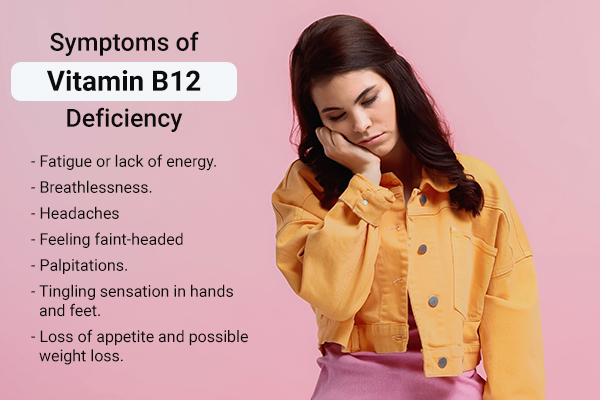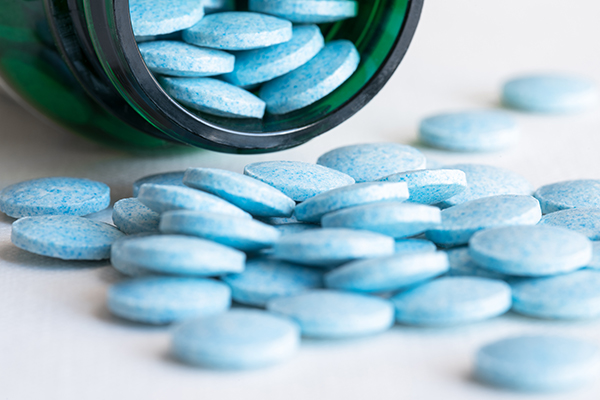In this article:
Vitamin B12 belongs to the group of B complex vitamins that play critical roles in the human body. Because it is a water-soluble vitamin, the body does not retain it as well as fat-soluble vitamins, and deficiencies can occur easily. (1)

Vitamin B12 is involved in the myelination of the nerves, among its many roles in the body. Myelin is the covering over the nerves that allows nerve impulses to travel quickly. (2)
Naturally, a deficiency of vitamin B12 will cause nerve damage, which can result in severe and debilitating neurological problems if left untreated.
How Does Vitamin B12 Deficiency Cause Nerve Damage?
Along with vitamins B1 and B6, vitamin B12 is involved in maintaining healthy nerves and facilitating proper nerve function. Together, these vitamins are called neurotropic vitamins. (3)
Animal studies have discovered vitamin B12 to play the below roles in nerves: (3)
- Prevents cell death in the nerves and promotes the growth of new cells by increasing the metabolism of proteins
- Promotes recovery of damaged nerves after an injury
- Delays the degeneration of nerves caused by diabetes and unmanaged high blood sugar levels
Vitamin B12 deficiency causes demyelination of nerves, which is the weakening of the outer layer or myelin sheath of the nerves that can impair nerve function. There can be a loss of sensation in the nerves with compromised myelin sheath, resulting in weakness of the limbs, especially in older adults. (4)
Since some nerves also control motor function, the impact of vitamin B12 deficiency can also cause loss of mobility. (4) As vitamin B12 plays many roles in protecting the nerves, a deficiency will result in nerve damage that may become severe if left untreated.
How to Identify a Vitamin B12 Deficiency

Some common symptoms of vitamin B12 deficiency include: (5)
- Fatigue or lack of energy
- Breathlessness
- Headaches and feeling faint
- Palpitations
- Tingling sensation in the hands and feet
- Loss of appetite and possible weight loss
Vitamin B12 deficiency can also result in “pernicious anemia,” which is caused not by a lack of vitamin B12 in the diet but by the inability to absorb vitamin B12 from food.
Since vitamin B12 deficiency symptoms are similar to those of several other conditions, you need to consult a doctor who will carry out blood tests to identify the deficiency as well as methods of treatment.
Daily Requirements and Sources of Vitamin B12
Vitamin B12 requirements can be easily met through the diet. It is present in foods including: (6)
- Fish
- Animal meats such as mutton and chicken
- Organ meats such as liver
- Eggs
- Dairy products
- Fortified cereals and nutritional yeast.
Additionally, vitamin B12 from dairy is better absorbed than that from fish or poultry.
The recommended daily intake of vitamin B12 is 2.4 mcg for men and women, 2.6 mcg for pregnant women, and 2.8 mcg for lactating women. (6)
Most-Asked Questions About Vitamin B12 Supplements
Can I take vitamin B12 supplements?

If you have been identified with a vitamin B12 deficiency, taking its supplements will help. However, if your recommended needs are met via your diet, there is no requirement for additional intake.
Is vitamin B12 supplementation harmful?
Since vitamin B12 is a water-soluble vitamin, the body excretes the excess via urine. So, no, supplementation is not harmful.
If I follow a vegan diet, how can I meet my vitamin B12 requirements?
Include foods that are fortified in vitamin B12 such as cereals or plant-based milk. You may also get prescriptions for vitamin B12 supplements.
Can I take a vitamin B complex supplement instead of a vitamin B12 supplement only?
B complex supplements also contain a sufficient amount of vitamin B12 needed for the body. Moreover, since it is a water-soluble vitamin, overdose is not likely to occur.
Final Word
Vitamin B12 is necessary to create new nerve cells and regenerate them after injury. A deficiency of vitamin B12 can cause nerve damage and neurological conditions.
Include dairy, fish, animal meats, eggs, and fortified cereals in your diet to meet your daily vitamin B12 requirement. Supplementation will not be harmful as vitamin B12 is a water-soluble vitamin.
- Was this article helpful?
- YES, THANKS!NOT REALLY


